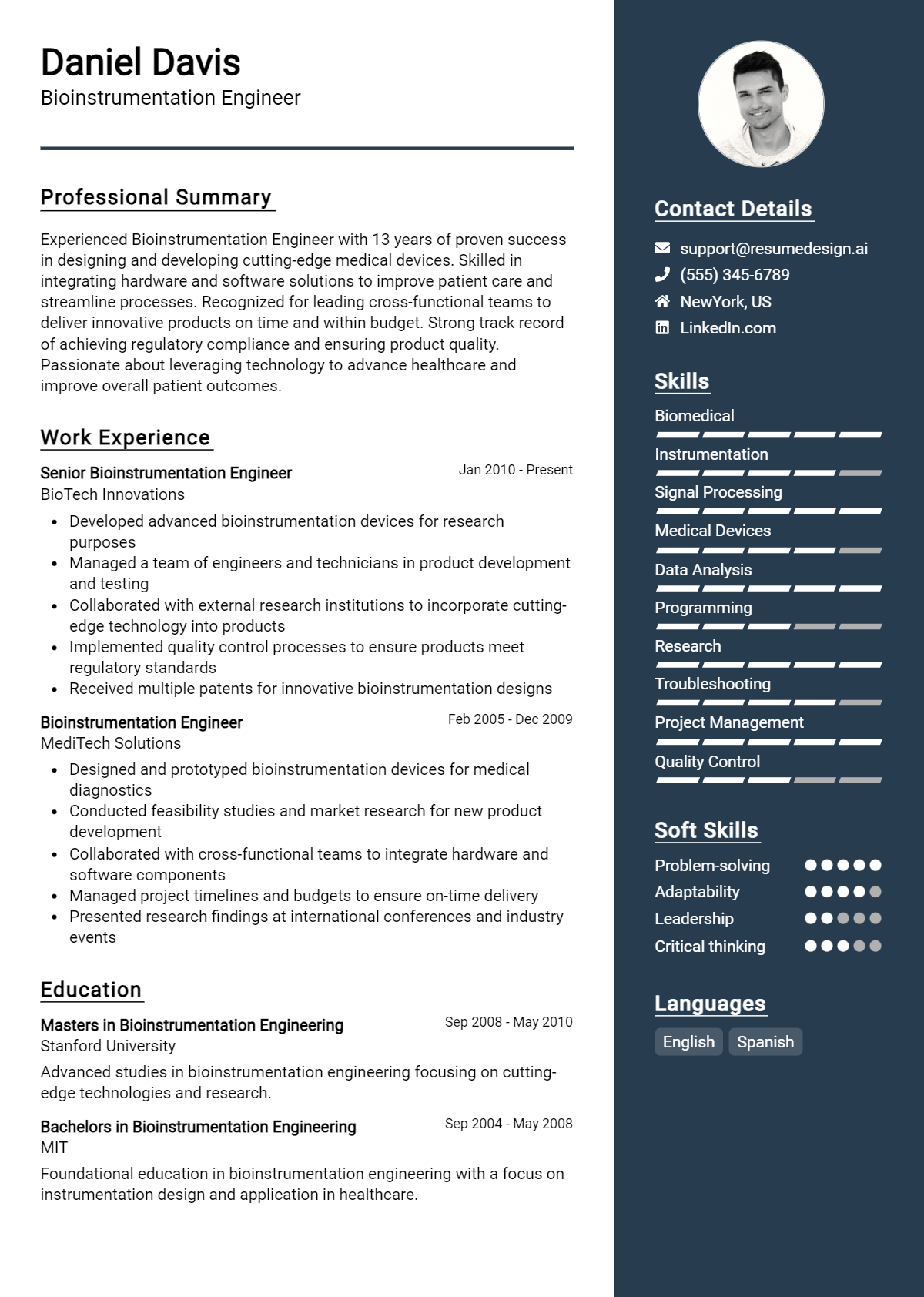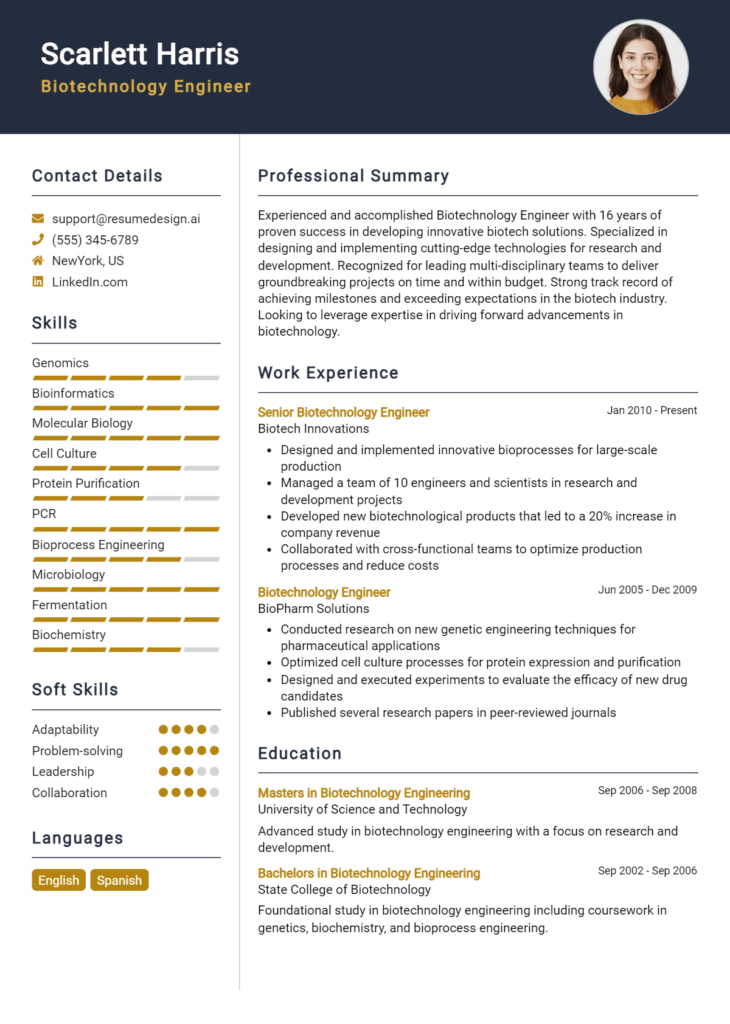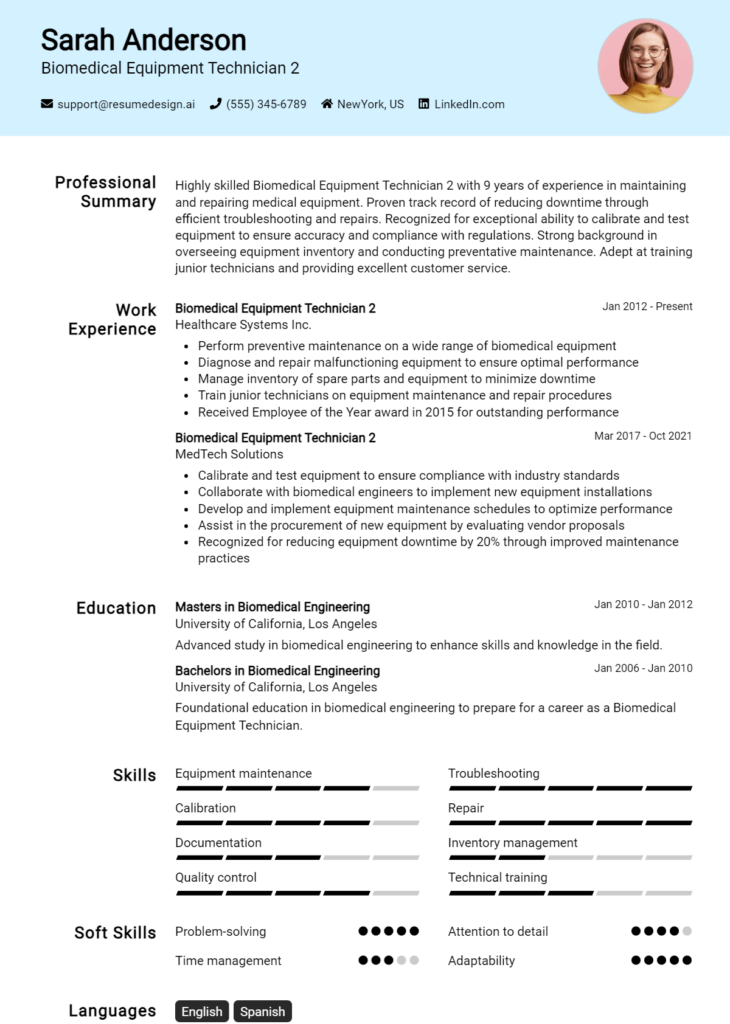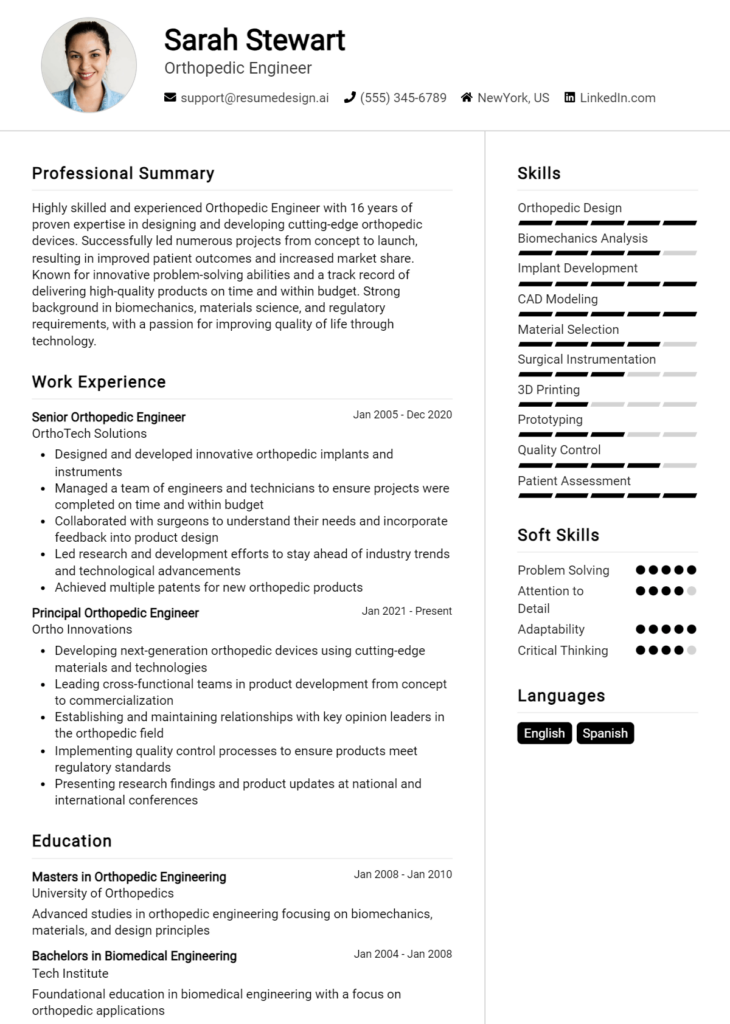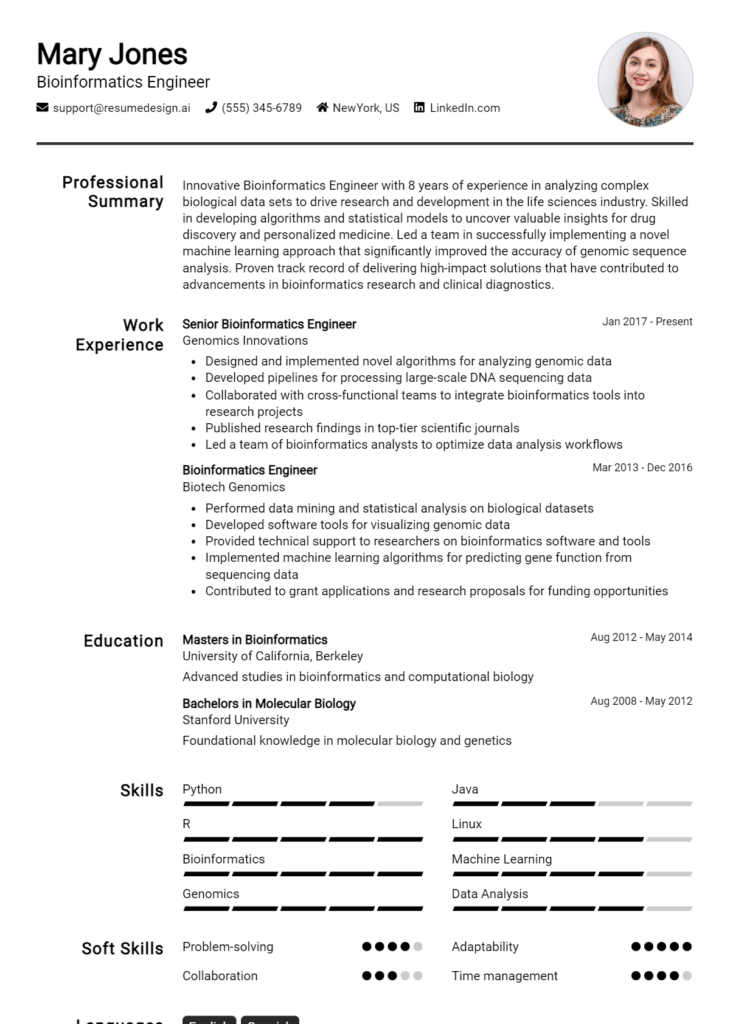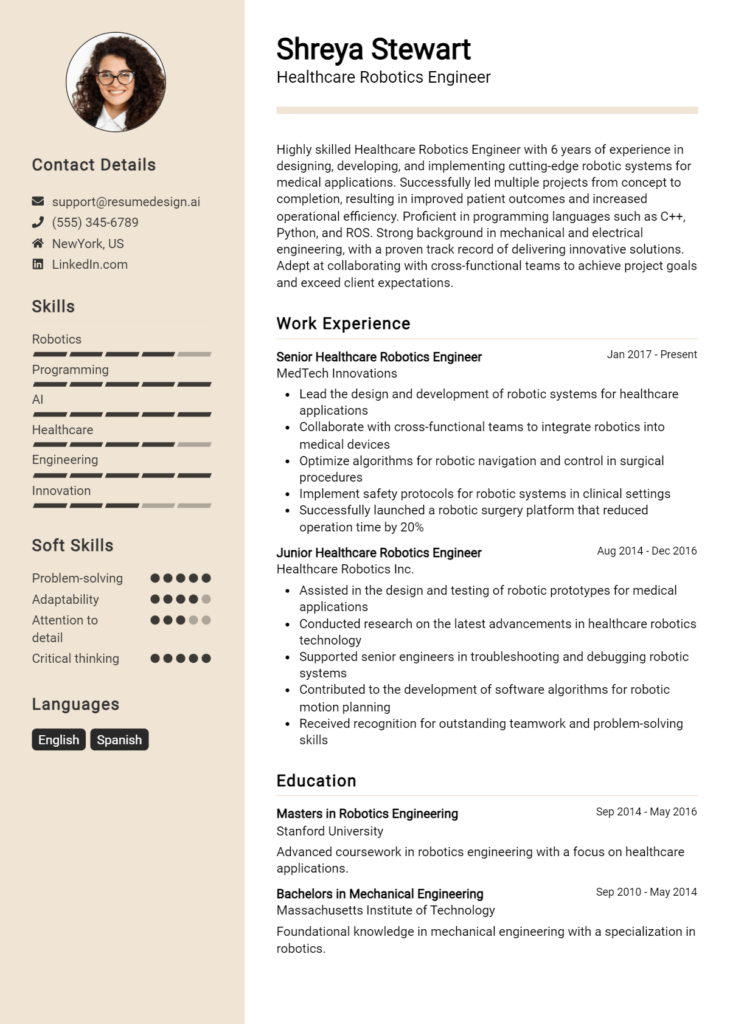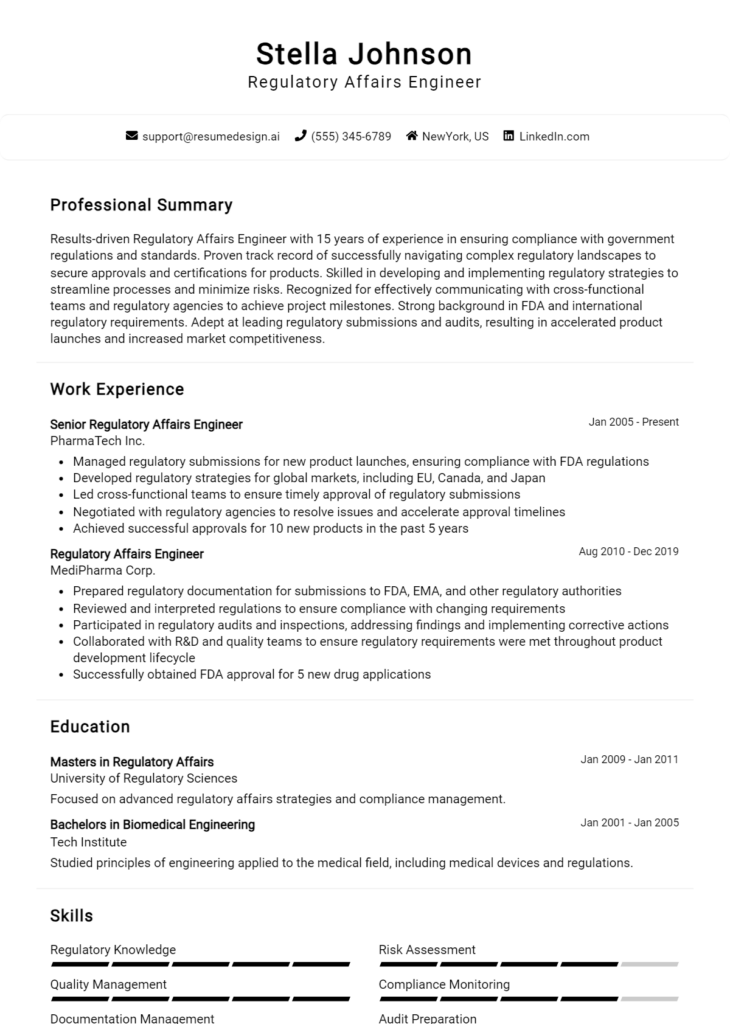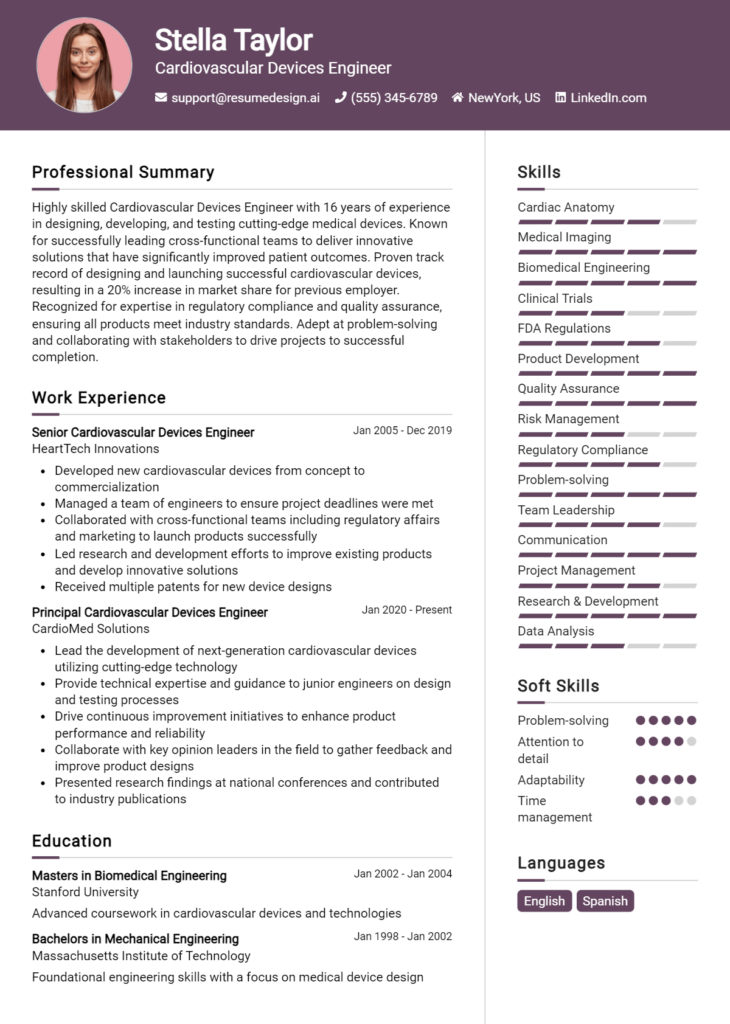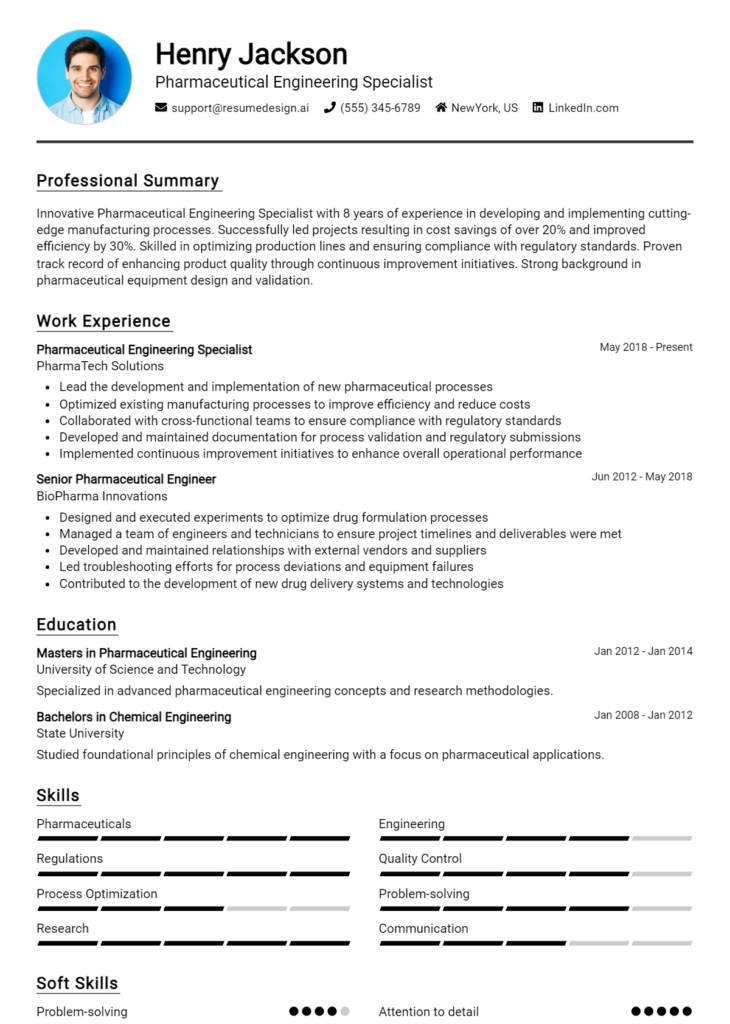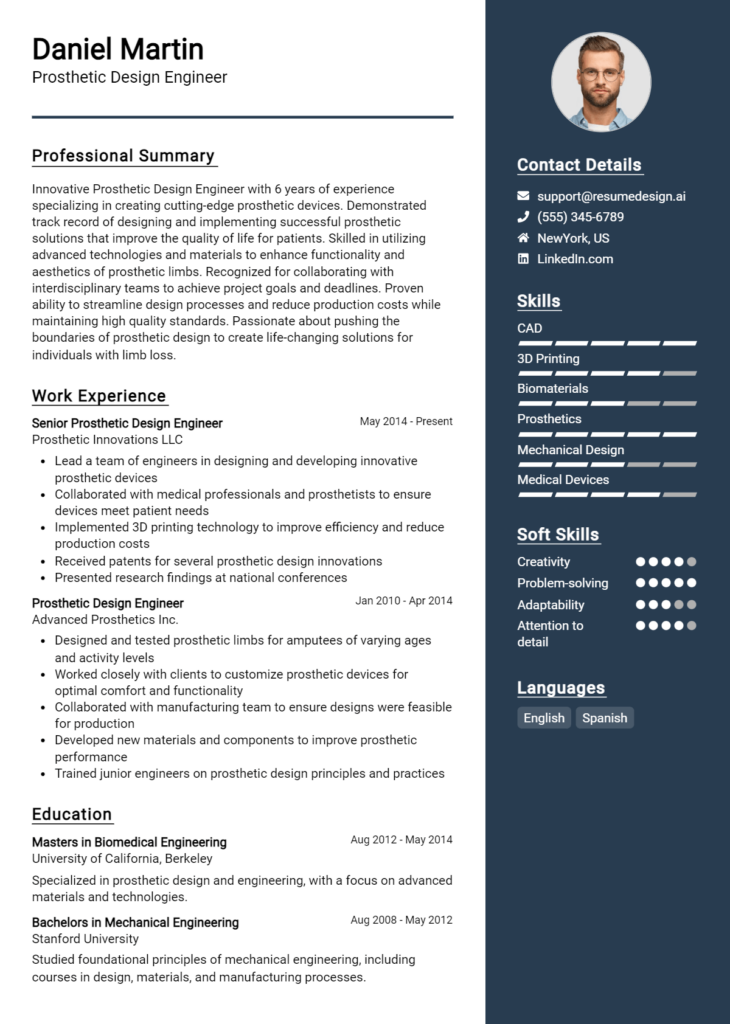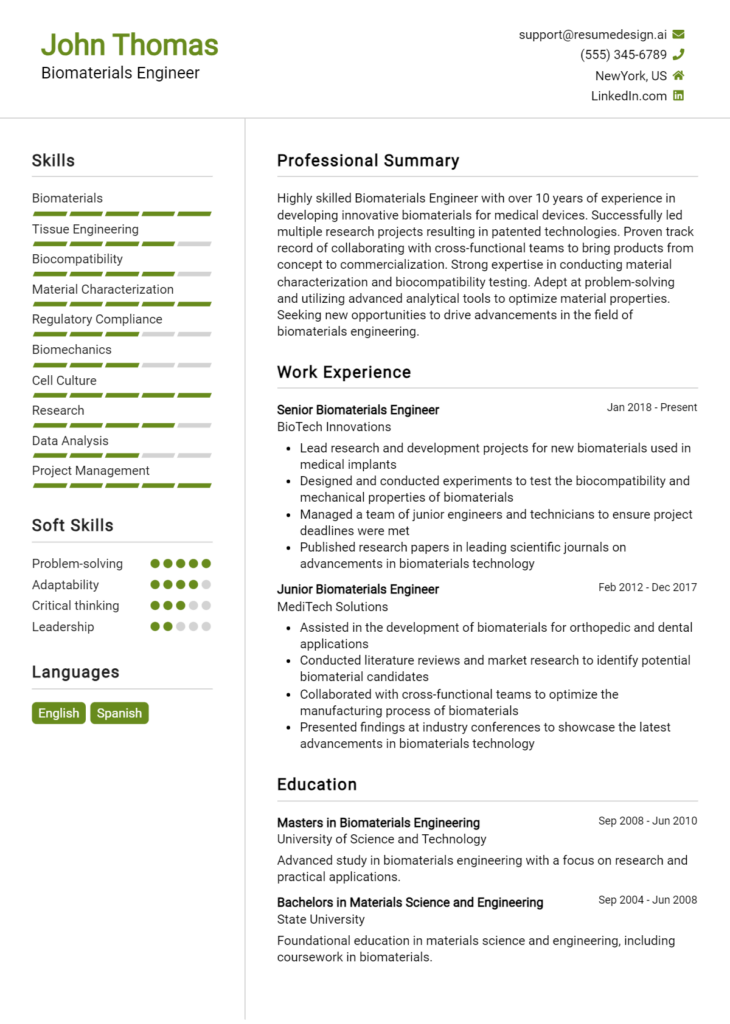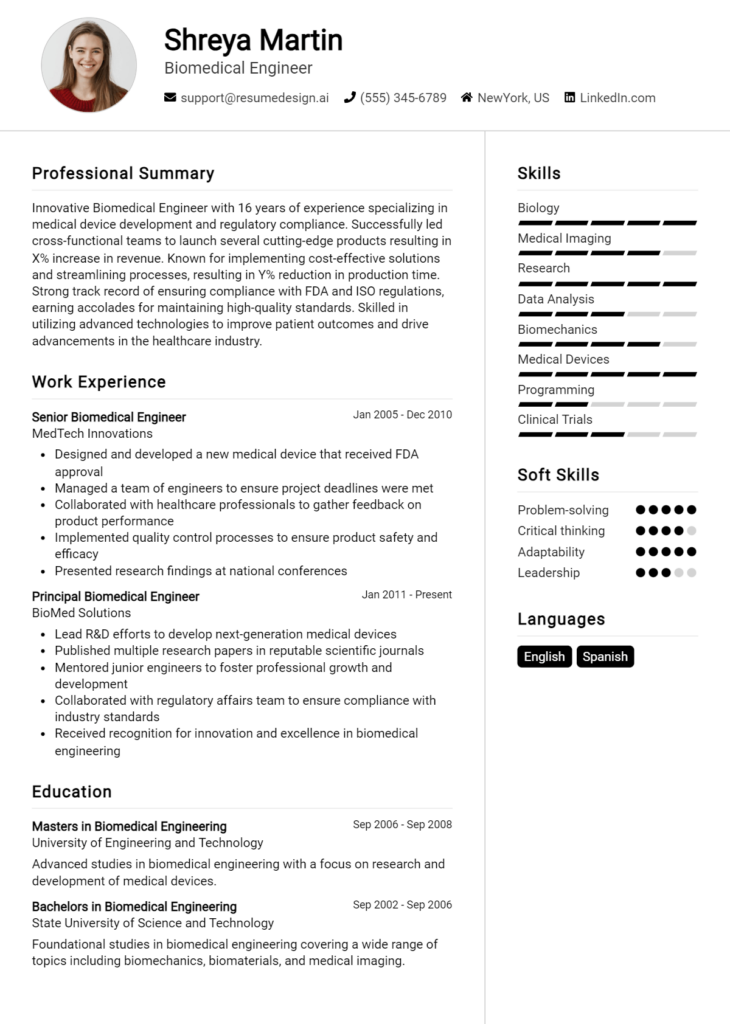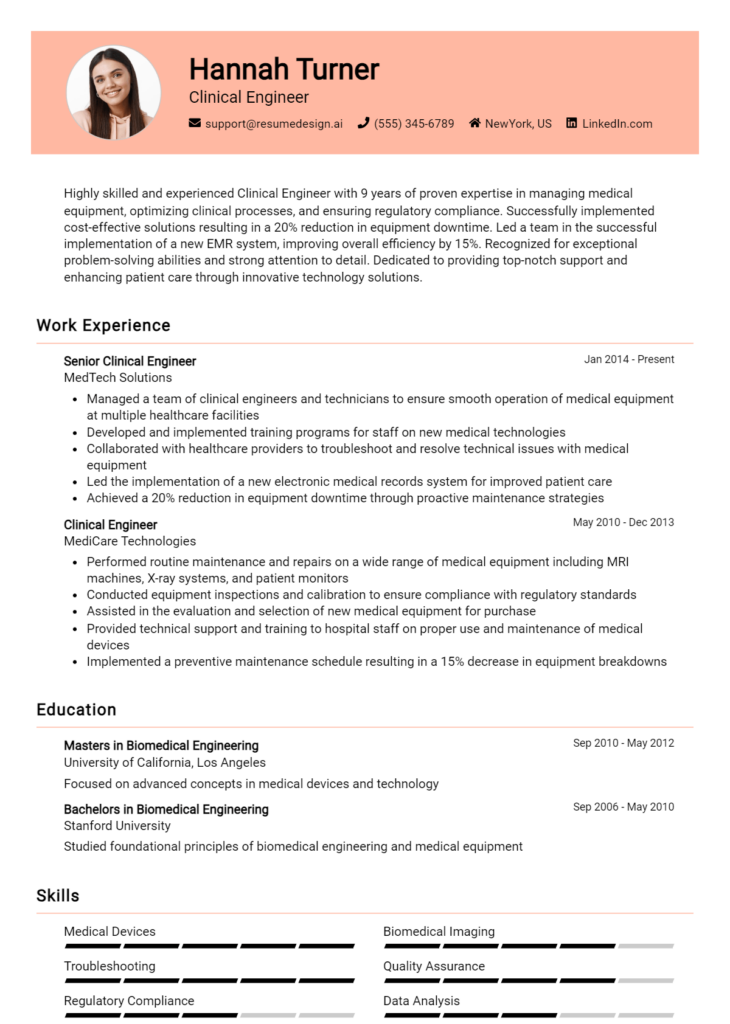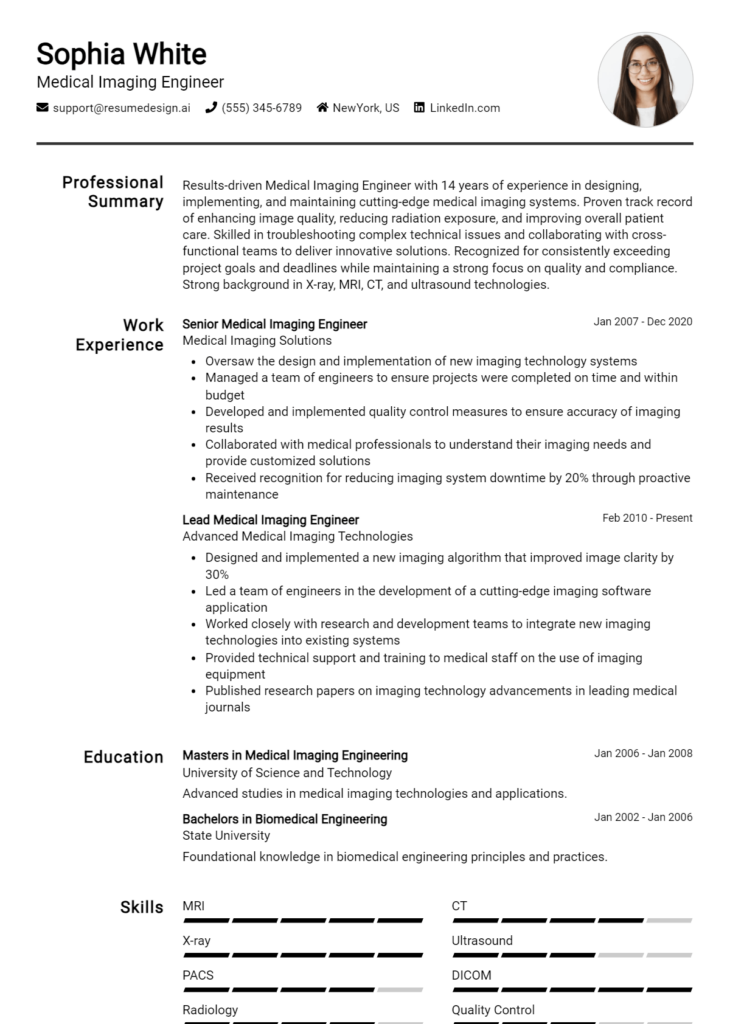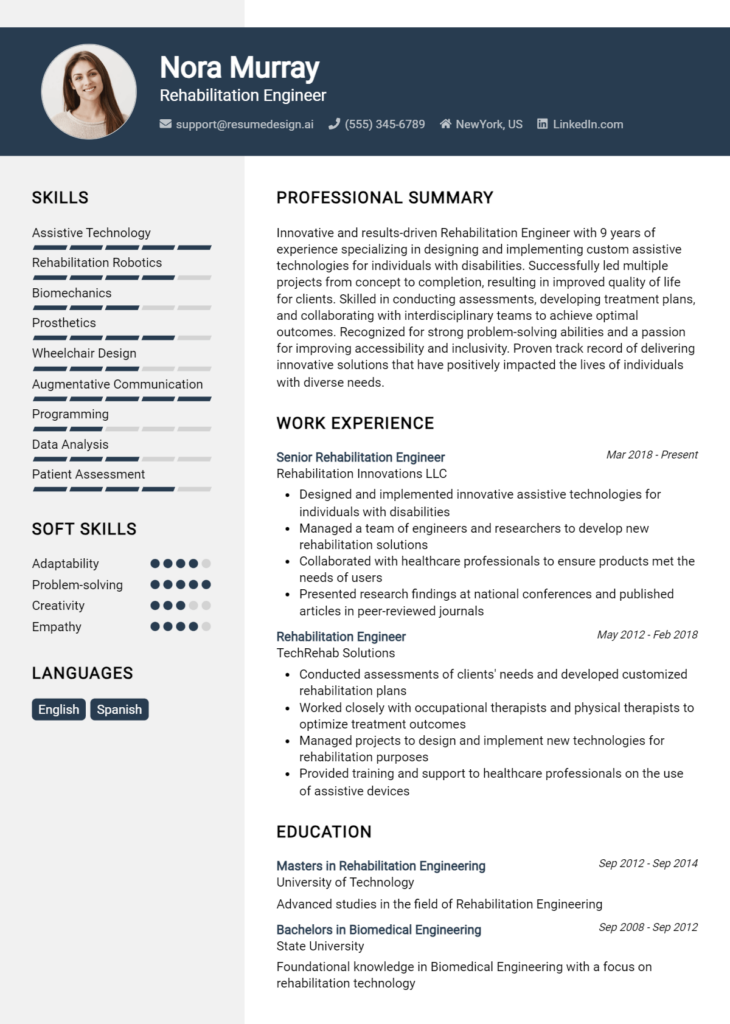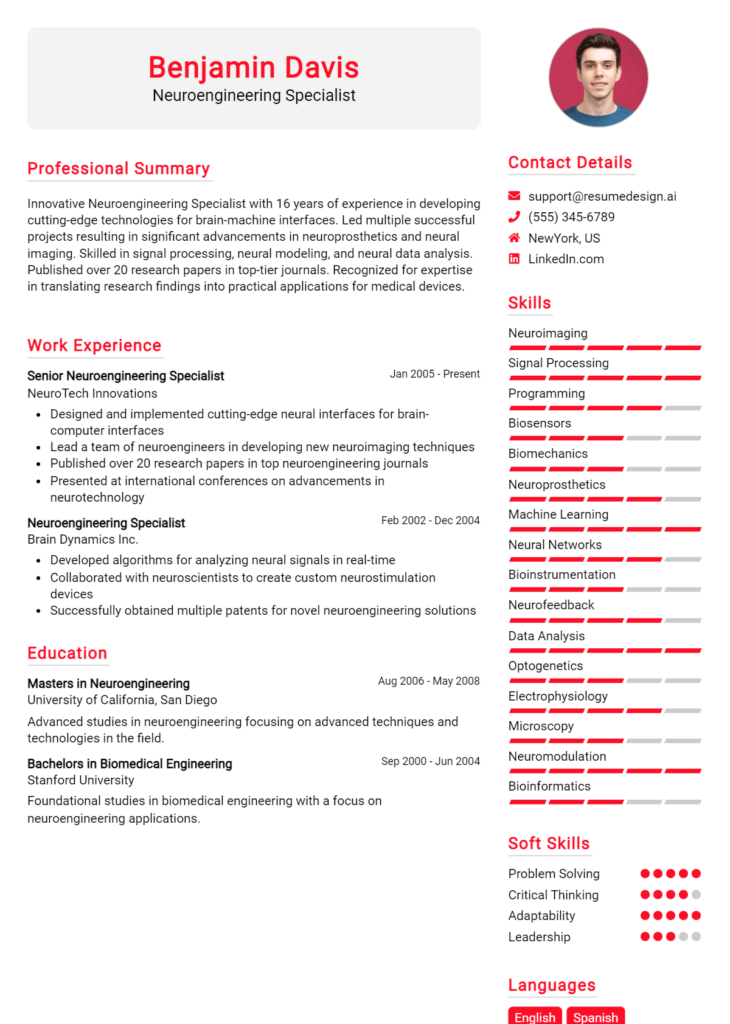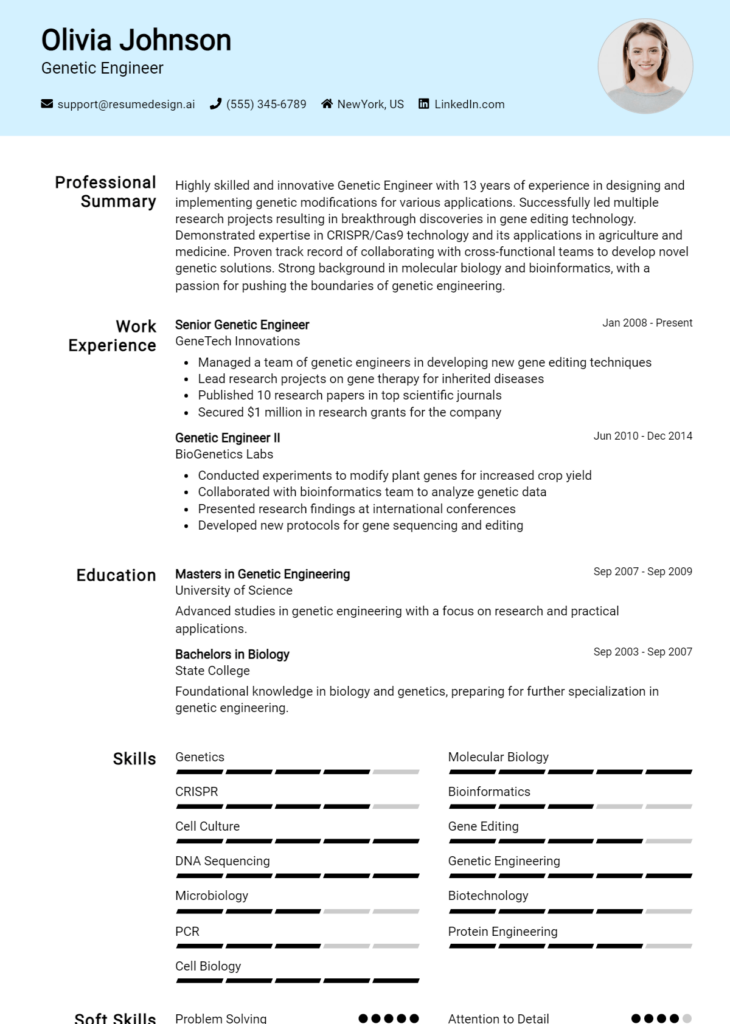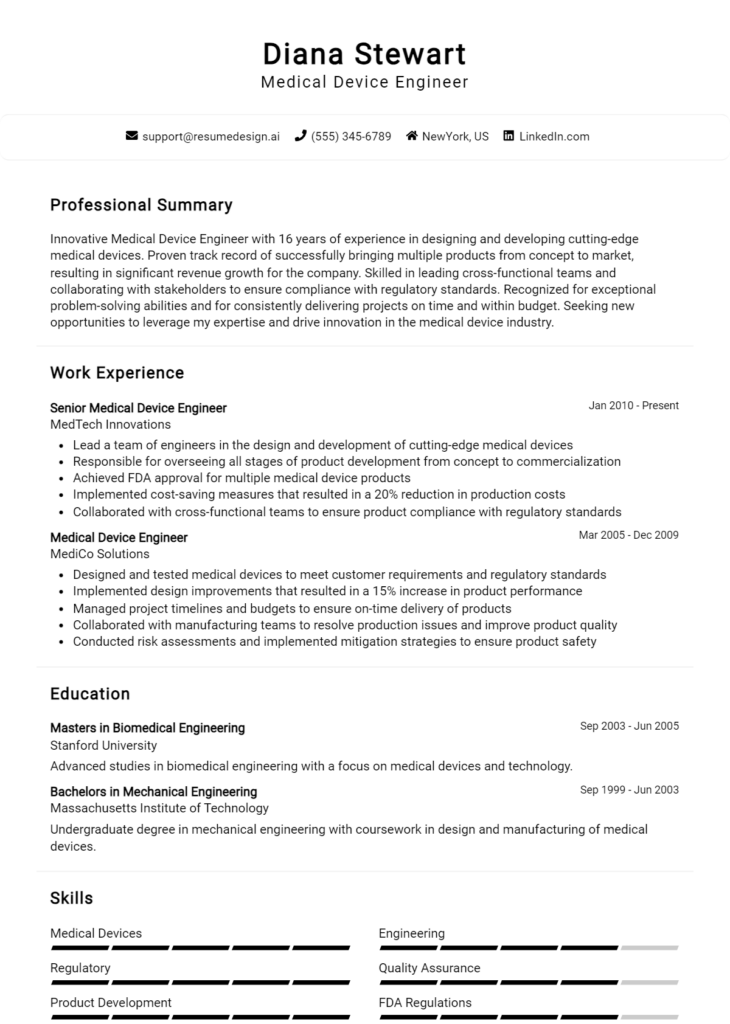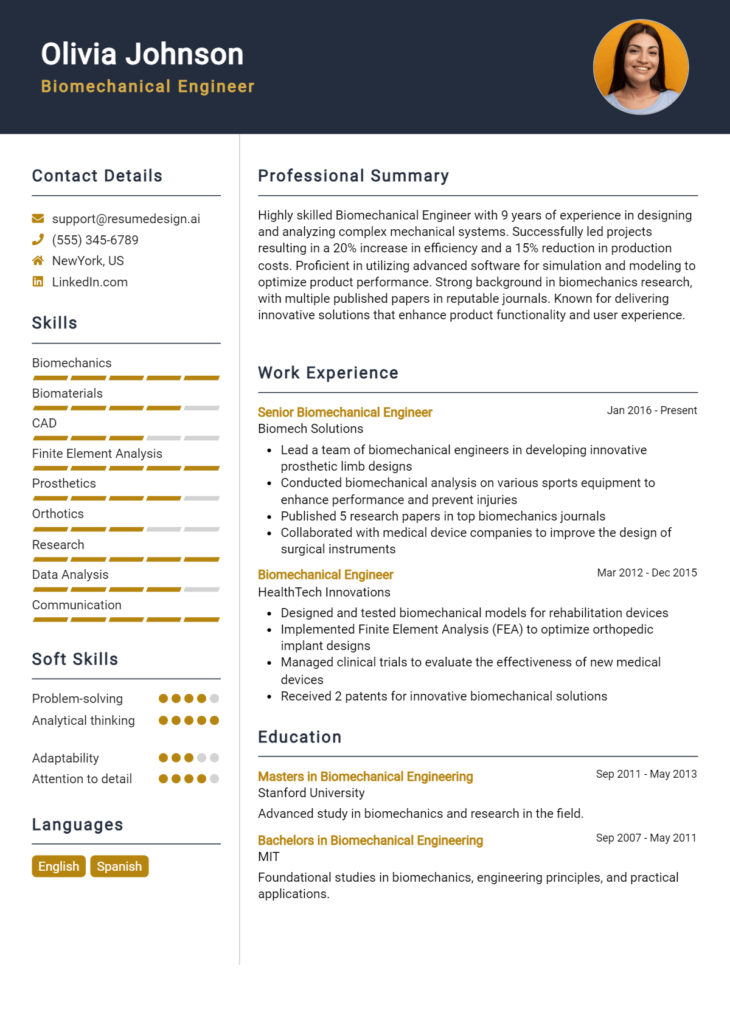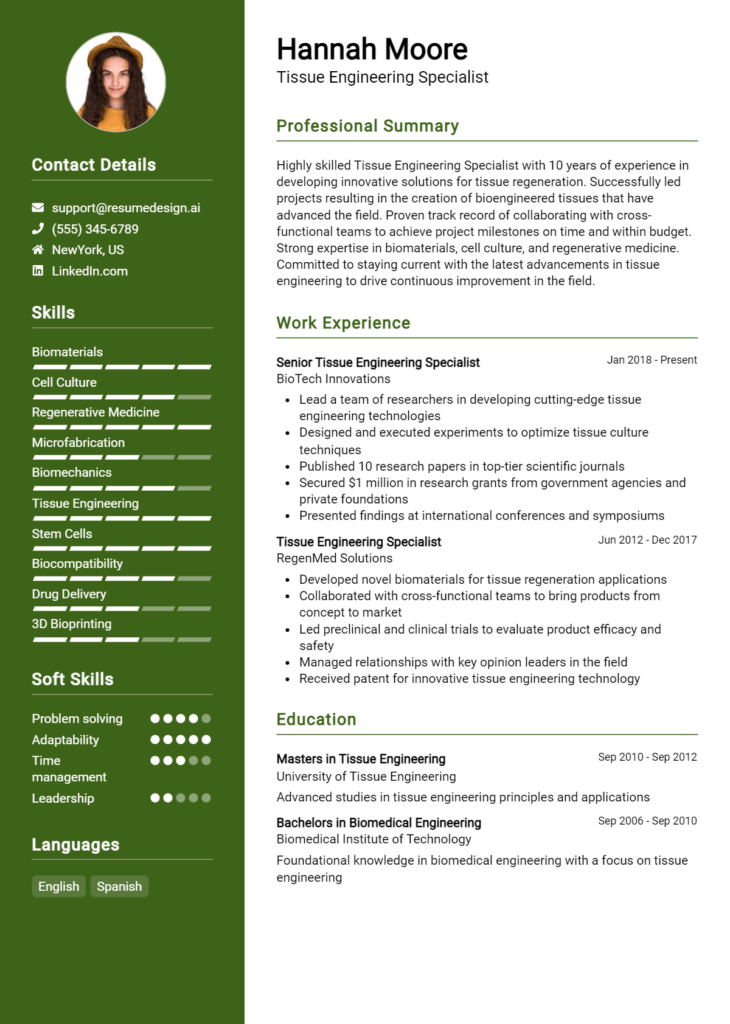Bioinstrumentation Engineer Core Responsibilities
A Bioinstrumentation Engineer plays a vital role in the healthcare sector by designing and maintaining medical devices and instrumentation used for diagnosis and treatment. This professional bridges various departments, including engineering, biology, and clinical settings, requiring strong technical skills in electronics and software, operational knowledge of medical regulations, and problem-solving abilities to tackle complex challenges. Effective communication and collaboration are crucial for achieving organizational goals, and a well-structured resume can effectively showcase these essential qualifications to prospective employers.
Common Responsibilities Listed on Bioinstrumentation Engineer Resume
- Design and develop biomedical instrumentation systems and devices.
- Conduct feasibility studies and prototype testing for new device concepts.
- Collaborate with research teams to integrate bioengineering solutions.
- Ensure compliance with regulatory standards and safety protocols.
- Perform system validations and troubleshooting for existing devices.
- Provide technical support and training for clinical staff on new technologies.
- Analyze data and generate reports for device performance evaluations.
- Participate in cross-functional teams to improve product designs.
- Manage project timelines and budgets during device development.
- Stay updated with advancements in biomedical engineering and technology.
- Document technical specifications and operational procedures.
- Assist in the preparation of grant proposals for research funding.
High-Level Resume Tips for Bioinstrumentation Engineer Professionals
In the competitive field of bioinstrumentation engineering, a well-crafted resume is crucial for making a strong first impression on potential employers. Your resume serves as your personal marketing tool, showcasing your unique skills, experiences, and achievements. It is essential that your resume not only highlights your technical capabilities but also reflects your understanding of the industry and your ability to contribute to innovative projects. This guide will provide practical and actionable resume tips specifically tailored for bioinstrumentation engineer professionals, ensuring that your application stands out in the crowded job market.
Top Resume Tips for Bioinstrumentation Engineer Professionals
- Tailor your resume to the specific job description by incorporating relevant keywords and phrases used in the posting.
- Highlight your educational background, especially degrees related to biomedical engineering, electrical engineering, or life sciences.
- Showcase your relevant work experience, focusing on roles that involved bioinstrumentation, medical devices, or related technologies.
- Quantify your achievements with specific metrics, such as improvements in device efficiency or reductions in production time.
- Include industry-specific skills, such as proficiency in CAD software, signal processing, or knowledge of regulatory standards.
- Emphasize any hands-on experience with laboratory equipment, prototyping, or testing methodologies.
- Use action verbs to describe your contributions and responsibilities, making your role in projects clear and impactful.
- Incorporate any certifications or additional training related to bioinstrumentation or biomedical devices that may enhance your qualifications.
- Keep your design clean and professional, ensuring that your resume is easy to read and visually appealing.
By implementing these tips, you will significantly increase your chances of landing a job in the bioinstrumentation engineer field. A targeted and well-structured resume not only highlights your qualifications but also demonstrates your commitment to the profession, making you a more attractive candidate to potential employers.
Why Resume Headlines & Titles are Important for Bioinstrumentation Engineer
When applying for a position as a Bioinstrumentation Engineer, the importance of a well-crafted resume headline or title cannot be overstated. A strong headline serves as the first impression and can immediately capture the attention of hiring managers by summarizing a candidate's key qualifications in a concise and impactful manner. It should be relevant to the specific job being applied for, providing a snapshot of the applicant’s expertise and value. A compelling title not only enhances visibility but also sets the tone for the rest of the resume, making it essential for candidates to invest time in crafting a standout headline.
Best Practices for Crafting Resume Headlines for Bioinstrumentation Engineer
- Keep it concise: Aim for one impactful phrase.
- Be role-specific: Tailor the headline to reflect the Bioinstrumentation Engineer position.
- Highlight key skills: Include relevant technical skills or certifications.
- Showcase experience: Mention years of experience or notable achievements.
- Use action words: Start with strong verbs to convey confidence.
- Avoid generic terms: Stay clear of vague titles that don’t provide specific information.
- Incorporate industry keywords: Utilize terms that align with the job description.
- Make it attention-grabbing: Use unique phrasing to stand out from other applicants.
Example Resume Headlines for Bioinstrumentation Engineer
Strong Resume Headlines
"Innovative Bioinstrumentation Engineer with 5+ Years of Experience in Medical Device Development."
“Certified Biomedical Engineer Specializing in Signal Processing and Sensor Design.”
“Results-Driven Bioinstrumentation Specialist with Proven Track Record in Project Management.”
Weak Resume Headlines
“Engineer Looking for Job.”
“Bioinstrumentation Engineer with Experience.”
Strong resume headlines are effective because they clearly communicate the candidate's unique value proposition, showcasing specific skills and accomplishments that resonate with hiring managers. They are tailored to the role, making it easy for recruiters to see the alignment between the candidate’s qualifications and the job requirements. In contrast, weak headlines fail to impress because they lack specificity and do not convey the candidate's expertise or achievements. Generic phrases do not provide a compelling reason for hiring managers to delve deeper into the resume, often leading to missed opportunities.
Writing an Exceptional Bioinstrumentation Engineer Resume Summary
A resume summary is a critical component for a Bioinstrumentation Engineer, as it serves as the first impression a hiring manager will have of the candidate. A well-crafted summary succinctly encapsulates the candidate's key skills, relevant experience, and notable accomplishments, making it easier for hiring managers to quickly assess their fit for the role. In an industry where technical expertise and practical application are paramount, a strong summary can differentiate a candidate from others. It should be concise, impactful, and tailored specifically to the job being applied for, effectively setting the stage for the rest of the resume.
Best Practices for Writing a Bioinstrumentation Engineer Resume Summary
- Quantify achievements: Use numbers to highlight your impact, such as improved efficiency or cost savings.
- Focus on relevant skills: Emphasize technical skills and competencies that align with the job description.
- Tailor the summary: Customize your summary for each application to reflect the specific requirements of the job.
- Keep it concise: Limit your summary to 2-4 sentences to maintain clarity and impact.
- Use strong action verbs: Begin sentences with powerful verbs to convey your contributions effectively.
- Highlight unique qualifications: Mention any certifications, specialized training, or unique experiences that set you apart.
- Showcase problem-solving abilities: Highlight examples where you successfully addressed challenges in bioinstrumentation projects.
- Convey passion for the field: Include a sentence about your enthusiasm for bioinstrumentation and its impact on healthcare or research.
Example Bioinstrumentation Engineer Resume Summaries
Strong Resume Summaries
Results-driven Bioinstrumentation Engineer with over 5 years of experience in developing innovative medical devices, leading to a 30% reduction in production costs and a 50% increase in product reliability. Expert in FDA regulations and quality assurance processes.
Dedicated Bioinstrumentation Engineer with a proven track record in designing and implementing biocompatible sensors. Successfully managed projects that led to a 25% improvement in patient monitoring accuracy in clinical settings.
Dynamic Bioinstrumentation Engineer skilled in integrating advanced imaging technologies, achieving a 40% decrease in diagnostic errors. Holds a Master’s degree in Biomedical Engineering and certifications in ISO 13485 and Six Sigma.
Weak Resume Summaries
Bioinstrumentation Engineer with some experience in the field. Looking for a job that utilizes my skills.
Motivated engineer who has worked on various projects in bioinstrumentation. Eager to bring my expertise to a new role.
The examples of strong resume summaries are effective because they provide specific achievements, quantify outcomes, and clearly demonstrate the candidate's relevant skills. They are tailored to the role and showcase the candidate's expertise in a compelling manner. In contrast, the weak summaries lack specificity and quantifiable results, making them less impactful and memorable to hiring managers. They fail to highlight the unique qualifications or experiences that would capture attention and distinguish the candidate in a competitive job market.
Work Experience Section for Bioinstrumentation Engineer Resume
The work experience section in a Bioinstrumentation Engineer resume is crucial as it serves as a platform to demonstrate the candidate's technical skills and expertise in the field. This section not only highlights the ability to manage teams effectively but also showcases a history of delivering high-quality products that meet industry standards. Quantifying achievements is essential, as it provides tangible evidence of a candidate's contributions and successes, thereby aligning their experience with the expectations of potential employers in the bioinstrumentation domain.
Best Practices for Bioinstrumentation Engineer Work Experience
- Detail specific technical skills and tools used in projects to demonstrate expertise.
- Quantify achievements with metrics such as percentage improvements, cost savings, or time reductions.
- Highlight leadership roles in team projects and the impact of collaboration on project success.
- Align experience descriptions with industry standards and terminologies.
- Include relevant certifications and training that support your technical capabilities.
- Use action verbs to convey a proactive approach and ownership of projects.
- Tailor each experience to the job description to ensure relevance.
- Showcase problem-solving instances that led to innovative solutions in bioinstrumentation.
Example Work Experiences for Bioinstrumentation Engineer
Strong Experiences
- Led a cross-functional team to develop a novel biosensor that improved detection sensitivity by 30%, resulting in a 20% increase in market share.
- Implemented a quality control process that reduced product defects by 25%, saving the company $150,000 annually.
- Collaborated with software engineers to design an integrated data analysis tool, enhancing data processing speed by 40%.
Weak Experiences
- Worked on various projects related to bioinstrumentation.
- Assisted in team efforts to develop new products.
- Involved in quality checks for instrumentation devices.
The examples provided illustrate the distinction between strong and weak experiences in a resume. Strong experiences are characterized by specific, quantifiable outcomes and demonstrate leadership and collaboration, reflecting a proactive approach to problem-solving. In contrast, weak experiences lack detail and fail to convey the candidate's impact, making them less compelling to potential employers. Highlighting measurable achievements and specific roles helps create a powerful narrative that stands out in a competitive job market.
Education and Certifications Section for Bioinstrumentation Engineer Resume
The education and certifications section of a Bioinstrumentation Engineer resume is crucial as it serves as a testament to the candidate's academic achievements and professional qualifications in a highly specialized field. This section not only showcases the candidate's foundational knowledge gained through formal education but also highlights industry-relevant certifications that demonstrate their commitment to continuous learning and professional development. By providing relevant coursework, certifications, and specialized training, candidates can significantly enhance their credibility and show alignment with the specific requirements of the job role, making them more appealing to potential employers.
Best Practices for Bioinstrumentation Engineer Education and Certifications
- Include only relevant degrees and certifications that directly relate to bioinstrumentation or biomedical engineering.
- Detail your coursework, especially any that is specialized or advanced, to showcase your depth of knowledge.
- Highlight certifications from recognized industry bodies, such as the Biomedical Engineering Society (BMES) or the National Institute for Certification in Engineering Technologies (NICET).
- List your education in reverse chronological order, starting with the most recent degree or certification.
- Be specific about your major and minor, if applicable, to clarify your area of expertise.
- Include any continuing education courses or workshops that demonstrate ongoing professional development.
- Consider including your GPA if it is notably high (e.g., above 3.5) and if you are a recent graduate.
- Use clear and concise language to ensure easy readability and comprehension by hiring managers.
Example Education and Certifications for Bioinstrumentation Engineer
Strong Examples
- M.S. in Biomedical Engineering, University of California, San Diego, 2022
- Certified Biomedical Equipment Technician (CBET), AAMI, 2021
- Relevant Coursework: Bioinstrumentation Systems, Medical Imaging, and Signal Processing
- B.S. in Electrical Engineering with a focus on Biomedical Applications, Georgia Institute of Technology, 2020
Weak Examples
- Bachelor of Arts in Philosophy, University of Texas, 2015
- Certification in General Project Management, 2019
- Relevant Coursework: Introduction to Psychology, 2018
- High School Diploma, 2012
The strong examples are considered effective because they directly relate to the field of bioinstrumentation and demonstrate a commitment to the discipline through relevant degrees and certifications. They highlight advanced coursework that showcases the candidate's technical expertise. In contrast, the weak examples are not aligned with the bioinstrumentation engineering role; they include degrees and certifications that lack relevance to the industry, thereby diminishing the candidate's credibility and perceived qualifications for the position.
Top Skills & Keywords for Bioinstrumentation Engineer Resume
As a Bioinstrumentation Engineer, showcasing the right set of skills on your resume is crucial for standing out in a competitive job market. Employers look for candidates who not only possess technical expertise but also demonstrate strong interpersonal abilities that foster collaboration and innovation. A well-crafted resume that highlights both hard and soft skills can effectively communicate your qualifications and readiness to contribute to the field of bioinstrumentation. By emphasizing these skills, you can illustrate your proficiency in developing and maintaining medical devices and instrumentation systems, as well as your capability to work in multidisciplinary teams to solve complex challenges.
Top Hard & Soft Skills for Bioinstrumentation Engineer
Soft Skills
- Problem-solving
- Communication
- Teamwork
- Adaptability
- Critical thinking
- Time management
- Attention to detail
- Creativity
- Leadership
- Project management
- Empathy
- Conflict resolution
- Initiative
- Interpersonal skills
- Analytical mindset
Hard Skills
- Biomedical instrumentation
- Signal processing
- Programming languages (e.g., Python, MATLAB, C++)
- Circuit design and analysis
- Medical device regulations (FDA, ISO)
- Data acquisition systems
- Sensors and transducers
- LabVIEW proficiency
- Quality assurance and testing
- Image processing techniques
- Statistical analysis
- Electrical engineering principles
- Prototyping and fabrication
- System integration
- Software development lifecycle (SDLC)
- Biomechanics
- Research methodologies
For further insights on how to effectively present your competencies, check out skills and work experience sections that can enhance your resume.
Stand Out with a Winning Bioinstrumentation Engineer Cover Letter
As a dedicated and passionate Bioinstrumentation Engineer, I am excited to apply for the position at your esteemed organization. With a strong background in biomedical engineering and a specialized focus on the design and development of innovative bioinstrumentation systems, I am confident in my ability to contribute effectively to your team. My academic achievements, combined with hands-on experience in developing medical devices and diagnostic tools, have equipped me with a unique skill set that aligns perfectly with the requirements of this role.
During my tenure at [Previous Company Name], I successfully led a project that involved the design and implementation of a novel biosensor for real-time glucose monitoring. This project not only enhanced my technical skills in system design and programming but also honed my ability to collaborate cross-functionally with teams in research and development, quality assurance, and regulatory compliance. I am adept at utilizing advanced software tools and programming languages, including MATLAB and Python, to simulate and analyze biosignal data, ensuring precision and reliability in our prototypes.
I am particularly drawn to your organization’s commitment to pioneering advancements in medical technology. I admire your recent initiatives to integrate artificial intelligence into bioinstrumentation, and I am eager to contribute my expertise in sensor technology and data analysis to further these efforts. My experience in conducting rigorous testing and validation processes will enable me to ensure that all instruments meet necessary regulatory standards and function optimally in clinical settings.
I am excited about the prospect of bringing my background in bioinstrumentation engineering to your team and contributing to groundbreaking projects that enhance patient care. Thank you for considering my application. I look forward to the opportunity to discuss how my skills and experiences align with your company’s vision and goals.
Common Mistakes to Avoid in a Bioinstrumentation Engineer Resume
When crafting a resume for a Bioinstrumentation Engineer position, it is crucial to present your skills and experience effectively to stand out in a competitive job market. However, many candidates make common mistakes that can undermine their chances of landing an interview. Here are some pitfalls to avoid when developing your resume:
Generic Objective Statement: Using a one-size-fits-all objective can make your resume seem impersonal. Tailor your objective to reflect your specific interest in bioinstrumentation and how you can contribute to the prospective employer.
Lack of Relevant Keywords: Failing to incorporate industry-specific keywords can result in your resume being overlooked by applicant tracking systems (ATS). Research the job description and include relevant terms that match your skills and experiences.
Overly Technical Jargon: While technical expertise is crucial in bioinstrumentation, using excessive jargon can alienate hiring managers who may not be familiar with specific terms. Strive for clarity and ensure that your accomplishments are understandable to a broader audience.
Neglecting Soft Skills: Focusing solely on technical skills can make your resume one-dimensional. Highlighting soft skills, such as teamwork, communication, and problem-solving, can demonstrate your ability to work effectively in interdisciplinary environments.
Unorganized Formatting: A cluttered or disorganized resume can be difficult to read and may deter hiring managers from considering your application. Use clear headings, bullet points, and consistent formatting to enhance readability.
Vague Descriptions of Experience: Providing unclear or overly broad descriptions of your previous roles can diminish the impact of your accomplishments. Use specific examples and quantifiable results to showcase your contributions effectively.
Ignoring Education Details: For many bioinstrumentation roles, educational qualifications are vital. Ensure you include your degrees, certifications, and relevant coursework, particularly in bioengineering, electronics, or related fields.
Excessive Length: A resume that is too long can lead to important information being overlooked. Aim for a concise document, ideally one page, or two pages if you have extensive experience, focusing on the most relevant information for the position.
Conclusion
As a Bioinstrumentation Engineer, your role is crucial in developing and improving medical devices and instruments that facilitate healthcare advancements. You are responsible for designing, testing, and maintaining systems that monitor and analyze biological signals, ensuring that they meet stringent regulatory standards and improving patient care. Your expertise combines engineering principles with biological sciences, making you a key player in the intersection of technology and healthcare.
To excel in this field, it's essential to highlight your technical skills, project experiences, and any relevant certifications in your resume. Tailoring your application materials to showcase your proficiency in areas such as instrumentation design, data analysis, and regulatory compliance can set you apart from other candidates.
As you reflect on your career and prepare for job opportunities, take a moment to review your Bioinstrumentation Engineer resume. Make sure it effectively communicates your accomplishments and expertise. To assist you in this process, various resources are available:
- Explore resume templates to find a design that best represents your professional style.
- Utilize the resume builder for a user-friendly way to create a polished and professional document.
- Review resume examples for inspiration on how to effectively present your skills and experiences.
- Don't forget the importance of a strong introduction—check out cover letter templates to craft a compelling narrative that complements your resume.
Take action now to enhance your job application materials and position yourself for success in the dynamic field of bioinstrumentation engineering!

